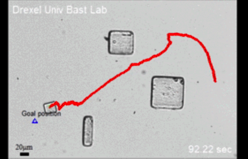

Microscopic robots, powered by bacterial flagellation, are a curious branch of robotics research, potentially leading to devices that can deliver drugs, perform surgical tasks, and help out with diagnostics. While bacteria has been harnessed in the past to power small devices, having those devices actually navigate to a desired target has been a challenge. At Drexel University researchers are now using electric fields to help their bacterial biobots detect obstacles and float around them on their way to the final destination.
